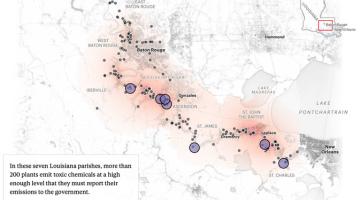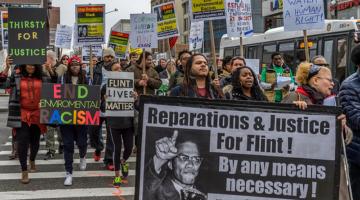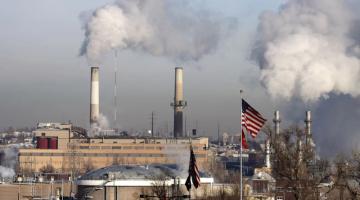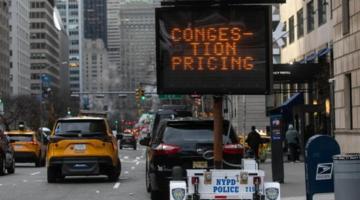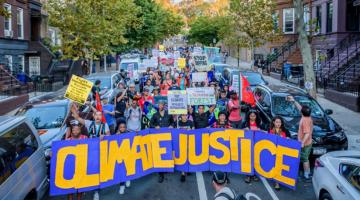In St. James Parish, a zoning ordinance divides industrial development along racial lines.
Originally published in Grist.
On the banks of the lower Mississippi River in St. James Parish, Louisiana, on sprawling tracts of land that break up the vast wetlands, hulking petrochemical complexes light the sky day and night. They piled up over the past half century, built by fossil fuel giants like Nucor and Occidental. In that time, they replaced farmland with concrete and steel, and threaded the levees with pipelines that carry natural gas from as far away as West Texas. When the plants came, the lush landscape of this part of south Louisiana deteriorated.
“The pecans are dry. They don’t yield like they used to,” said Gail Leboeuf, a longtime resident of the region and a co-founder of the community group Inclusive Louisiana. “The fig trees, the blackberries — all that I came up making a living off of is not there anymore.”
Leboeuf is a leading activist in “Cancer Alley,” the 85-mile stretch of land between Baton Rouge and New Orleans where strips of residential blocks are sandwiched between the region’s more than 150 petrochemical plants. She has spent the past several years fighting a new wave of industrial development headed to her parish — in particular, to its predominantly Black neighborhoods.
The racialized permitting practices visible across Cancer Alley are particularly pronounced in St. James, where 20 of the parish’s 24 plants are located in the majority-Black 4th and 5th districts — an equivalent of 1 plant for every 250 people. In 2014, the parish council passed a zoning ordinance that marked much of those two districts for industrial use. That same year, the council barred two chemical companies, Petroplex and Wolverine, from constructing new industrial plants in the majority-white 3rd District. In 2022, the council conceded to white residents’ demands for a moratorium on solar farm development until they commissioned a study to determine if the project might lower their property values or put their homes at risk during a hurricane.
Since 2018, the parish has supported the construction of a new $9.4 billion plastics manufacturing complex owned by the Taiwanese chemical giant Formosa in the 5th District. On a tract of land approximately the size of 80 football fields, the company plans to build 16 facilities that would release cancer-causing pollutants like ethylene oxide and vinyl chloride. The nearest neighborhood is approximately 1 mile down the road. A study by ProPublica found that Formosa’s emissions could more than triple the cancer risk in some St. James neighborhoods.
In March 2023, the Mount Triumph Baptist Church and the local organizations Rise St. James and Inclusive Louisiana filed a lawsuit against the parish government, seeking an end to this alleged practice of discriminatory permitting. They hope to have a moratorium put in place on the licensing of heavy industry “and the correspondingly lethal levels of pollution” in the parish’s Black areas. Environmental advocates hailed it as a landmark case. But last November, a federal judge dismissed the complaint’s racial discrimination claims, pegging them to the 2014 zoning ordinance, and arguing that they are barred by the statute of limitations, which lasts for one year. “Although plaintiffs’ claims are procedurally deficient, this court cannot say that their claims lack a basis in fact or rely on a meritless legal theory,” U.S. District Judge Carl Barbier of the Eastern District of Louisiana wrote in his decision.
On Monday, lawyers representing St. James residents presented their argument about the statute of limitations to the U.S. Fifth Circuit Court of Appeals. They claim that the parish’s long-standing practice of discriminatory land use decisions constitutes a “continuing violation” that cannot be dismissed simply because the zoning ordinance was passed outside the one-year statute of limitations period.
“The parish’s decadeslong policy, practice, and custom of not only steering and luring lethal petrochemical plants to majority-Black districts, but doing so while implementing protections only for majority-white districts is discriminatory and unlawful,” said Sadaf Doost, an attorney at the Center for Constitutional Rights, in a press release.
The defendant’s lawyers said that the plaintiffs should have taken note of the parish’s discriminatory zoning as soon as the ordinance was passed in 2014 and sued within the year. Judge Karen Hayes, who is hearing the appeal, seemed to challenge this reasoning, which, she said, makes it sound like “if you didn’t sue within a year then you can be discriminated against in a bunch of different ways until the rest of eternity.”
Additionally, the plaintiffs’ lawyers, who are from the Center for Constitutional Rights and Tulane University’s Environmental Law Clinic, pushed back on the district judge’s finding last year that the plaintiffs lacked standing to bring a claim under the Religious Land Use and Institutionalized Persons Act and the Louisiana Constitution’s protection of historic linguistic and cultural origins.
The wide tracts of land along the Mississippi River that chemical companies bought up to build their sprawling industrial complexes were once plantations that used slave labor to grow sugarcane. Louisiana’s state archeologist, Charles McGimsey, believes that every former plantation in St. James contains unmarked cemeteries of former slaves. And so the plaintiffs are arguing that the parish’s land use decisions are discriminatory, because they allow chemical companies to build plants on land that is culturally significant.
“Indeed, one of the lingering traumas of slavery is the inability of descendants to locate the gravesites of their ancestors,” the plaintiffs wrote in their original complaint. “But, in those cases where cemeteries can be identified, that location bears profound cultural, historical, and religious significance for descendants.”
Last year, the district judge said that any harm to sites of historic, cultural, or religious significance is the fault of petrochemical companies — not the parish council. On Monday, the plaintiffs’ lawyers countered by arguing that the council’s zoning and permitting decisions have led to the destruction of the unmarked grave sites.
The parish did not respond to multiple requests for comment.
The success of the St. James case will hinge principally on whether the court accepts the plaintiffs’ argument about the statute of limitations, which would apply to four of their seven claims. If the judge also finds the racial discrimination complaints compelling, then the plaintiffs will have a stronger case. In the current judicial-political landscape, there are fewer legal mechanisms to argue cases of discrimination, particularly when it comes to environmental harms.
Historically, environmental groups have had difficulty proving discrimination under the U.S. Constitution’s equal protection clause, since it focuses on discriminatory intent rather than prejudicial outcomes. “In order to be able to show that this discrimination is intentional you have to point to this pattern” — the parish council rejecting a solar farm in a white neighborhood but building a plastics plant in a Black one — said Pam Spees of the Center for Constitutional Rights on Monday. “They know what they’re doing.”
As of August, Cancer Alley residents — and any other victims of environmental harms in Louisiana — now have one less legal tool to seek redress. After a long fight against the Environmental Protection Agency, federal judge James Cain ruled that the EPA cannot use a civil rights law that admits legal claims based on “disparate impacts” rather than discriminatory intent to curb toxic pollution in Louisiana.
As difficult as such a fight may appear to be for residents like Gail Leboeuf, St. James Parish, despite itself, may be helping their case: In the time since the residents first filed their lawsuit in March, the parish has approved two more industrial projects — an expansion of Koch Methanol’s plant and an extension of the Acadian gas pipeline, which would attach to Koch — both zoned for St. James’s 5th District.




